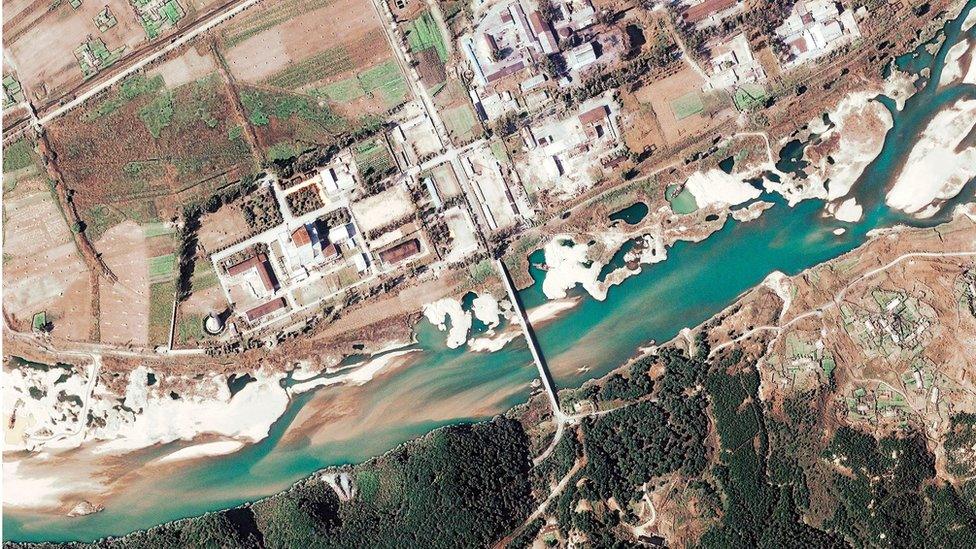North Korea missile launch: Trump berates China on trade
- Published
North Korea missile launch: What we do know and don't know
Donald Trump has criticised China following North Korea's test of a long-range missile, condemning it for increasing trade with Pyongyang.
"So much for China working with us," the US president tweeted, external.
The US and South Korea conducted a ballistic missile fire exercise in the Sea of Japan in response to the North.
China and Russia have urged both sides to stop flexing their military muscle and said they oppose any attempts at regime change in North Korea.
"It is perfectly clear to Russia and China that any attempts to justify the use of force by referring to [United Nations] Security Council resolutions are unacceptable, and will lead to unpredictable consequences in this region which borders both the Russian Federation and the People's Republic of China," Russian Foreign Minister Sergei Lavrov said.
"Attempts to strangle the DPRK [North Korea] economically are equally unacceptable," he added.
The missile launch, the latest in a series of tests, was in defiance of a ban by the UN Security Council.
The US has asked for an urgent meeting of the Security Council to discuss the issue. A closed-door session of the 15-member body will take place later on Wednesday.
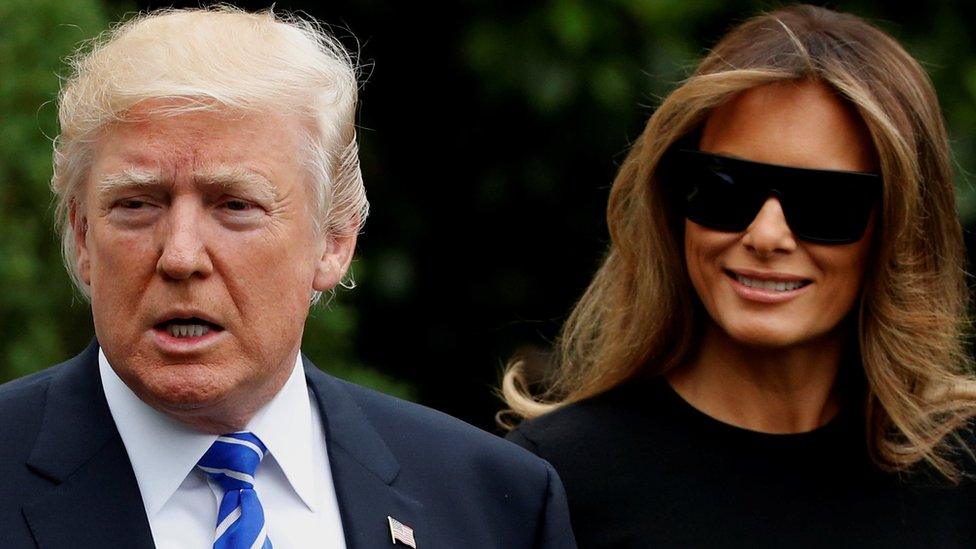
Donald and Melania Trump have left Washington for a trip to Warsaw and Hamburg
The US president held talks with China's leader Xi Jinping at his Mar-a-Lago retreat in Florida in April.
Mr Trump hailed "tremendous progress" with China after those meetings.
The trade figures showing an increase in trade between China and North Korea, which he was apparently referring to in Wednesday's critical tweet, appear to relate to the period before that April meeting, external.
The US president is now en route to Poland and Germany, where he will meet Mr Xi for the second time.
China, which is Pyongyang's main economic ally, and Russia have called on North Korea to suspend its ballistic missile programme in exchange for a halt on the large-scale military exercises by the US and South Korea.
Mr Xi and Russian President Vladimir Putin, who met in Moscow on Tuesday, said "the opposing sides should start negotiations".
Japan on Tuesday said "repeated provocations like this are absolutely unacceptable" and lodged a protest.

Why have US-China relations soured?
Barbara Plett Usher, BBC State Department correspondent
There's little doubt the honeymoon between Donald Trump and Xi Jinping is over.
The administration is frustrated that China isn't doing more to put the squeeze on North Korea. Beijing is angry about recent moves taken by the White House, including sanctions on a Chinese bank for doing "illicit" business with Pyongyang, and a $1.4 billion arms sale to Taiwan.
In one way this tension is neither new nor surprising - previous American presidents encountered similar resistance from Beijing, which is determined to prevent chaotic upheaval in North Korea. But the stakes are higher because Pyongyang's nuclear weapons programme is becoming more of a threat.
Mr Trump might respond by imposing more sanctions on Chinese banks and front companies that deal with North Korea. But some Asia experts say China would be readier to increase economic pressure on the regime if the US took up Beijing's push for negotiations to deal with the crisis.

Why Trump only has bad North Korea options
What has North Korea said?
Tuesday's launch was North Korea's first-ever test launch of an intercontinental ballistic missile (ICBM).
State news agency KCNA quoted leader Kim Jong-un as saying the test was a "gift" to the Americans on their independence day.
The report warned of the possibility of more tests, saying he ordered officials to "frequently send big and small 'gift packages' to the Yankees".
Pyongyang said earlier the Hwasong-14 ICBM had reached an altitude of 2,802km (1,731 miles) and flew 933km for 39 minutes before hitting a target in the sea.
North Korea, it said, was now "a full-fledged nuclear power that has been possessed of the most powerful inter-continental ballistic rocket capable of hitting any part of the world".

What is an ICBM?

A long-range missile usually designed to carry a nuclear warhead
The minimum range is 5,500km (3,400 miles), although most fly about 10,000km or more
Pyongyang has previously displayed two types of ICBMs: the KN-08, with a range of 11,500km, and the KN-14, with a range of 10,000km, but before 4 July had not claimed to have flight tested an ICBM. It is not clear what differentiates the Hwasong-14

Does North Korea really have a long-range weapon now?
Some experts believe that Tuesday's test proves that North Korea has a missile that could travel across the globe and reach Alaska.

Physicist David Wright said it could reach a maximum range of about 6,700km, external on a standard trajectory, while South Korea's defence ministry on Wednesday put the range between 7,000 and 8,000km.
But whether that missile could deliver a warhead is still a question.
Pyongyang claimed the rocket carried a "heavy warhead" and that it "accurately hit the targeted waters without any structural breakdown".
South Korea said there was no evidence proving the missile could withstand high temperatures and successfully re-enter the atmosphere, reported Yonhap news agency., external
Experts believe Pyongyang does not yet have the capability to miniaturise a nuclear warhead, fit it onto a long-range missile, and ensure it is protected until delivery to the target.
They say many of North Korea's missiles cannot accurately hit targets.
But others believe that, external at the rate it is going, Pyongyang may overcome these challenges and develop a nuclear weapon that could strike the US within five to 10 years.

What now for Washington? - Dr John Nilsson-Wright, Chatham House
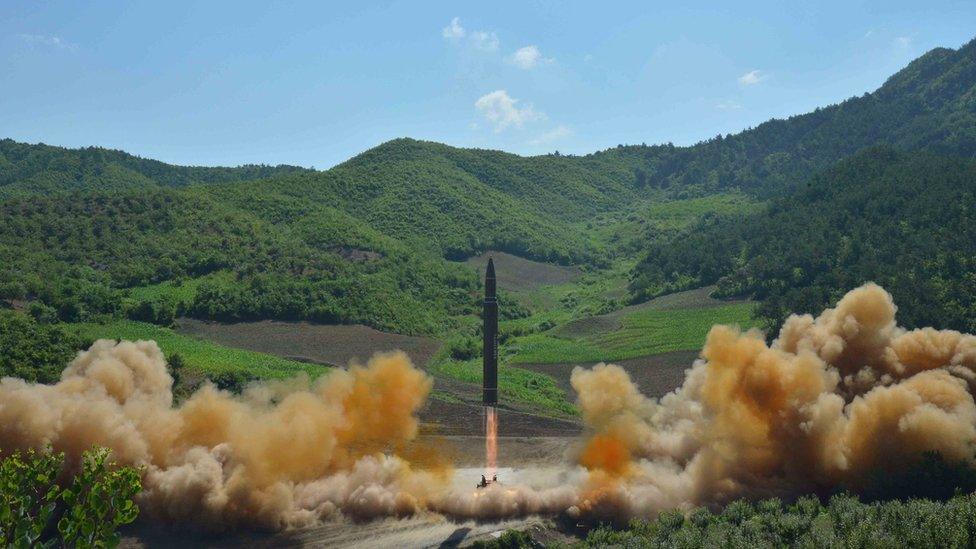
North Korean media released this image of Tuesday's missile launch
By bringing Alaska within range, the new missile test is an unambiguous game-changer in both symbolical and practical terms.
US territory (albeit separate from the contiguous continental US) is now finally within Pyongyang's cross-hairs.
For the first time a US president has to accept that the North poses a "real and present" danger not merely to north-east Asia and America's key allies - but to the US proper.
President Trump's weakness lies in having overplayed his hand too publicly and too loudly.

- Published20 April 2017
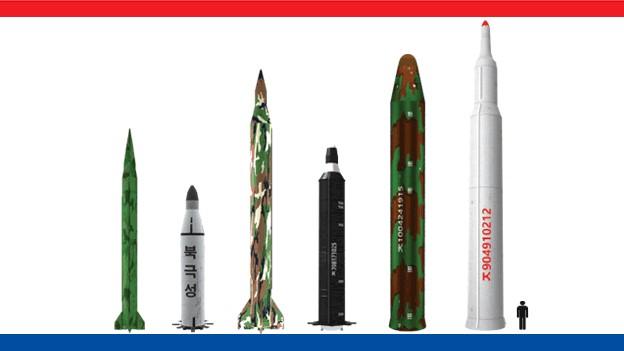
- Published4 July 2017
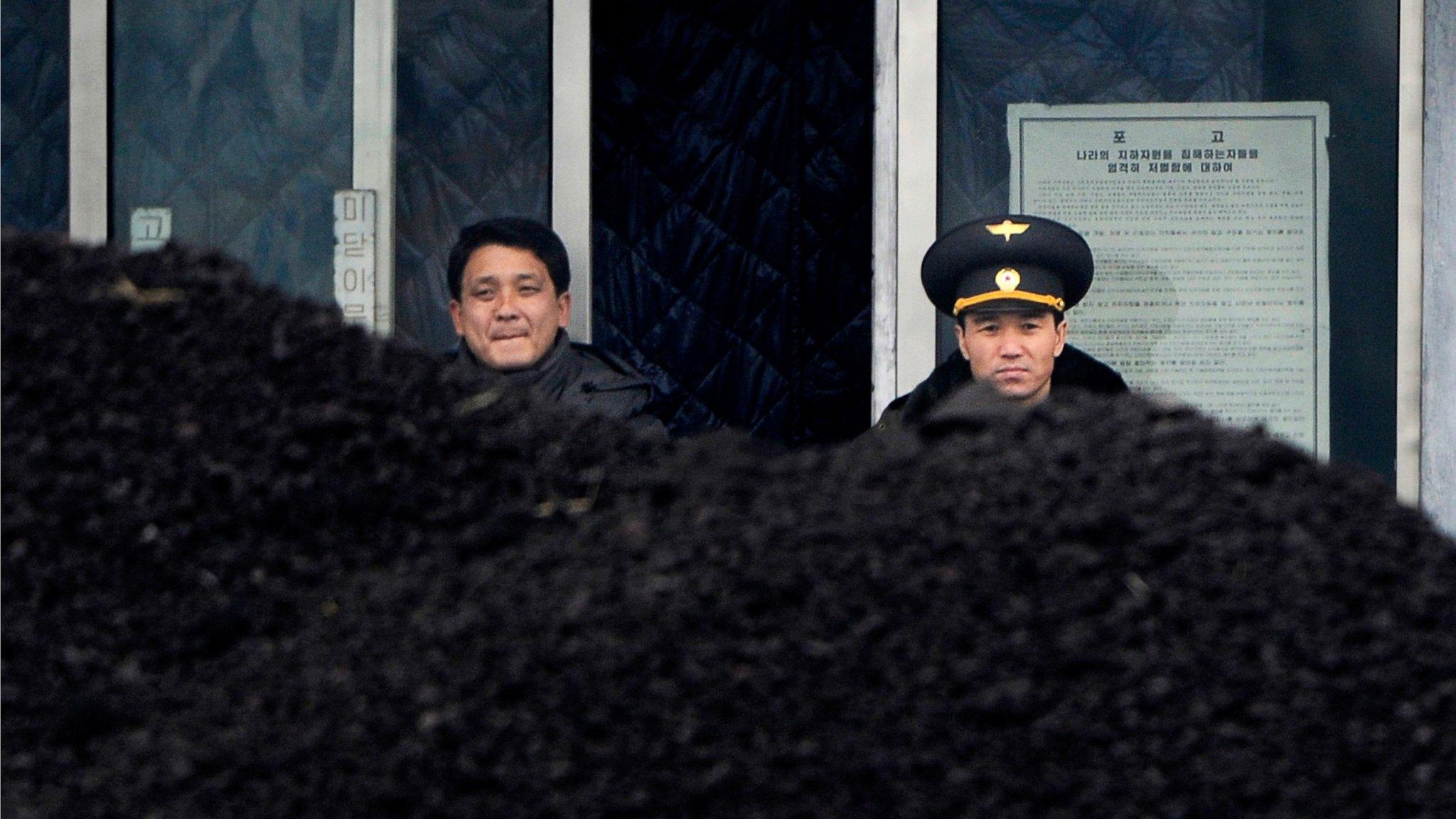
- Published10 August 2017
- Published10 August 2017
